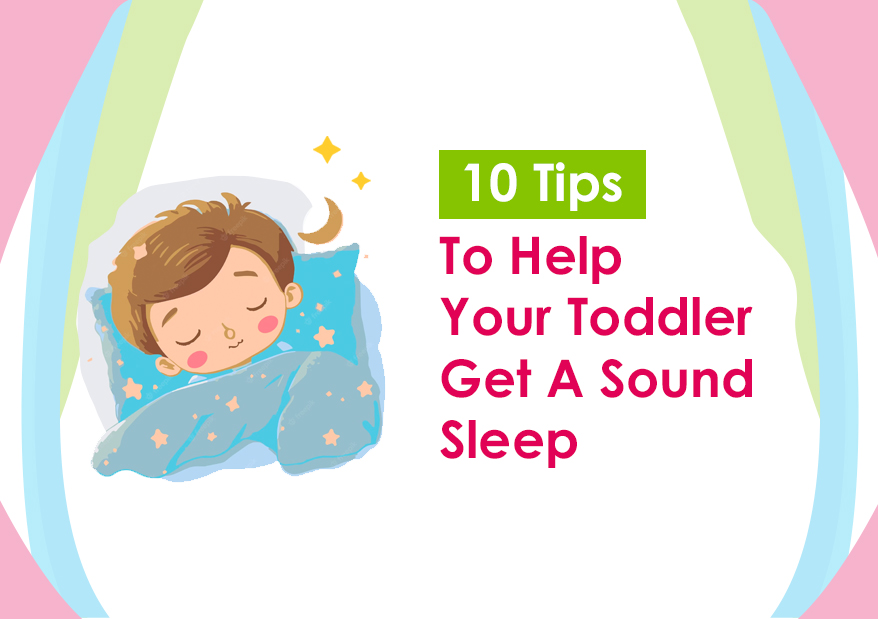Getting a good night’s sleep is much needed for your baby’s health and well-being. It helps their little bodies grow, strengthens their immune system, and improves their mood and cognitive function. If your baby is well-rested, they’ll likely be more content and happy during the day, making it easier for you to bond with them and enjoy loveable moments together. While it can be challenging to establish healthy sleep habits for your little one, the long-term benefits are totally worth it. It takes patience and persistence to create a nurturing sleep environment that promotes restful, rejuvenating sleep for your baby. Here are 10 sleep tips for kids that you can put to use to help your baby get a good sleep.
1. Establish a Routine
Developing a nighttime routine is the first step towards assisting your infant in sleeping. Your baby reads the cues in the environment and that’s how they learn it’s time to sleep. Dim the lights 30 minutes before bedtime – the right lighting will help set your baby’s internal clock. Turning down the lights at night and exposing your infant to bright light in the morning will facilitate this process. After you’ve reduced the stimuli, you can incorporate other calming rituals such as giving your baby a nice warm bath, singing lullabies, or reading them a story. Start the bedtime ritual in place ideally when your baby is about 6 to 8 weeks. You must maintain consistency and do the activities in the same order every night. This will help your baby get accustomed to the routine and learn what to expect.
2. Maintain an early bedtime
Timing is just as significant as the routine when considering putting your baby to sleep. Babies are prepared for an early bedtime following the sun setting when their melatonin levels (the potent sleep hormone) increase – around the time they reach 8 weeks old. Instead, if you keep them up late, they become overstimulated and it becomes much harder to put them to sleep later.
In spite of the fact that it may turn dark at any moment between 5:30 in the winter and 8:30 in the summer, keep to the clock and put your toddler to bed at roughly 6:30 or 7 p.m regardless. Shut the blinds if the sun is still up. This will help you set an early bedtime for your baby.
3. Act on drowsy cues
By observing your baby’s drowsy cues, you can tune into their natural biological rhythms and ensure that when they are placed in their cot, their melatonin levels are elevated and they are ready to fall asleep peacefully. If you wait too long, your baby might become overtired. In addition to having reduced melatonin levels, they also will start producing cortisol and adrenaline, which are wakefulness chemicals, in their brains. Your baby may wake up early as a result of this – making it difficult for them to fall asleep and stay asleep. Your cues are that your baby is calm, still, uninterested in their surroundings, and gazing off into space. This means it’s time for bed! Take advantage of it and begin your sleep ritual.
4. Create an environment for sleep
Create a peaceful, womb-like environment in your baby’s nursery by using blackout shades and a white noise machine to block out outside noise and light. Rapid Eye Movement, or REM, sleep makes up half of a baby’s sleep. Since dreams happen during this period of light sleep, it may feel as though anything could wake your baby up – your loud conversation in the room outside, noise from your phone or TV, or even that creaking door. On the flip side, with a white noise machine, the background noise drowns out everything and makes that less likely to occur. If you’re unsure what volume of noise reaches your baby’s nursery, have one person chat while standing outside the doors or play the TV to test the volume. Ensure that the voice should only be muffled and not completely drowned out by the white machine.
5. Remove Snacking
A newborn has to be fed every two to 2.5 hours during the first eight weeks of their life. Record the length of each breastfeeding session for your baby who is being breastfed. If your baby is being bottle-fed, keep a 24-hour track of the number of ounces and times your baby consumes.
When they eat at night for 20 minutes and only for five or ten minutes during the day, it means that they are simply snacking and they’re not eating enough to keep their stomachs full to sleep through the night. On the other hand, by about 2.5 to 3 months, if your baby is eating well during the day, they should be able to sleep for a 4- to 6-hour period at night.
Work on spacing out your baby’s meals so they’re truly hungry each time to help them eat more effectively. When your baby starts showing more interest in their surroundings while being fed, try feeding them in a calm, dark environment. Talk to the best pediatrician in Dubai about your baby’s meal plan.
6. Co-sleep with your baby
Try co-sleeping if your baby continues to get up frequently at night and you are worn out. Your baby will enjoy the closeness and you will get the extra sleep you need. Also keep your infant close during the day. If they want to nap on you, let them have it instead of trying to rush them to bed. Also, when you need to change or feed your baby in the middle of the night, it can be helpful to have them close by. Additionally, since they can hear and smell you, being nearby may help them feel more comfortable and easy to sleep.
7. Establish rules for napping
Even though it could be tempting, you should attempt to give your little one at least one nap each day in their crib. They’ll get the rest they require and can become used to their crib in this way. Your baby will have longer awake periods by the time they’re 3 to 4 months old, so it’s best that you start establishing a nap plan that includes one nap in the morning, one in the early afternoon, and, if necessary, a little nap in the late afternoon. Naps are also a great time for you to practise putting your baby down while they’re sleepy.
8. Swaddle correctly
Swaddling can be helpful to soothe your baby and help them fall asleep. When babies are swaddled, they feel secure and comforted, which can make it easier for them to relax and settle down. It’s important to note that swaddling should be done correctly. To swaddle, use a thin blanket. Lay the blanket flat and fold down one corner to swaddle. With their head above the folded corner, place your infant face-up on the blanket. Wrap the left corner of the blanket over your infant’s torso, tucking it between the right arm and the right side of their body, and straighten their left arm. After that, tuck the right arm beneath and fold the blanket’s right corner over them and under their left side. The blanket’s bottom should be loosely folded or twisted before being tucked beneath your infant on one side. Consult with the kids specialist in Dubai for guidance.
9. Say no to meal before bed
Newborns frequently doze off while eating. While it’s common, if you find your baby frequently nodding off during feeding, your baby might come to believe that they must eat in order to go back to sleep. This can be overcome by progressively moving your baby’s meal earlier until they can complete it. Finish the meal routine by reading them a book or singing a song. This will allow time for the food to digest and make your baby comfortable for bed.
10. Recognise that you are the expert on your child
Trust your own instincts when it comes to how to get your baby to sleep or how long they should sleep. The more you’re concerned that you’re not doing the right thing, the more you’re ruining this precious time with your infant. You will only become anxious if you hear your friend, a relative, or a neighbour brag about how their infant was sleeping through the night. As much as you can, tune out the unwanted comparisons. All you’ll need is a little bit of observation, a little bit of trial and error, and a lot of flexibility to get your baby to sleep soundly.
If you have any concerns or need advice on this matter, contact the best pediatric doctor in Dubai
myPediaclinic – the best pediatric clinic in Dubai
Our experienced award-winning Pediatricians at myPediaclinic in Dubai Healthcare City help young children have a stress-free and relaxing visit. As one of the most trusted and kid-friendly clinics in the country, the doctors and staff at myPediaclinic are focused on delivering quality treatment and consultation for the long-term health and well-being of their patients.





